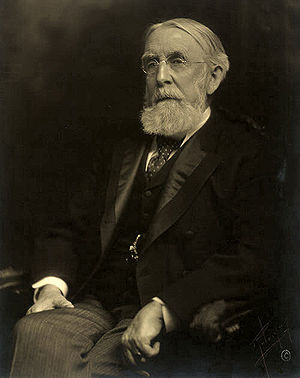Can Science and Faith be Reconciled? [part 1 of 3]
I've been interested recently in some of the questions that 21st century Americans have about the Christian faith. One question that comes up frequently is, "Can science and faith be reconciled?"In researching this question, I've discovered three main answers.Option 1:No, because science and faith are and have been at war.This option is widely-held among modern people. But there is one problem with it: it is historically false.Without the Church, No Science Andrew Dickson White?(1832-1918) was one of the co-founders of Cornell University. In 1896 he published a 2 volume work called?A History of the Warfare of Science with Theology in Christendom,?which put forward the idea that the Christian faith was responsible for interfering and holding back scientific achievement. White's work was extremely influential in the first part of the 20th century, and his argument did much to convince many that faith and science were at war, despite the obvious problems with his argument.The first problem with claiming that science and faith are at war is that, as many historians now argue, the culture of Christianity was directly responsible for the development of science in the West. Christians believe in a rational God who created the universe according to rational principles, a belief that is necessary to science. Rather than being antagonistic to science, the Christian faith allowed it to flourish. The greatest universities of the first 17 centuries of the last 2 millennia were virtually all developed by the Church to be places where faith could seek understanding, and most of the greatest scientific minds up until the Enlightenment were devout Christians.Second, A.D. White had an obvious bias against orthodox Christianity. For some reason, modern people, so quick (and rightly so) to be skeptical of many authoritative claims accept as gospel the claims of those who are obviously biased against the Church; many of us accept those arguments unthinkingly. In a culture that values science (as ours does), you can greatly undermine the faith by claiming the Church is anti-science, and A.D. White and many people have successfully done so. It says a lot about our modern anti-Church bias that we are eager to embrace any arguments that make the Church look badly. But What About Galileo?"That sounds great," some readers are thinking, "but what about Galileo?"
Andrew Dickson White?(1832-1918) was one of the co-founders of Cornell University. In 1896 he published a 2 volume work called?A History of the Warfare of Science with Theology in Christendom,?which put forward the idea that the Christian faith was responsible for interfering and holding back scientific achievement. White's work was extremely influential in the first part of the 20th century, and his argument did much to convince many that faith and science were at war, despite the obvious problems with his argument.The first problem with claiming that science and faith are at war is that, as many historians now argue, the culture of Christianity was directly responsible for the development of science in the West. Christians believe in a rational God who created the universe according to rational principles, a belief that is necessary to science. Rather than being antagonistic to science, the Christian faith allowed it to flourish. The greatest universities of the first 17 centuries of the last 2 millennia were virtually all developed by the Church to be places where faith could seek understanding, and most of the greatest scientific minds up until the Enlightenment were devout Christians.Second, A.D. White had an obvious bias against orthodox Christianity. For some reason, modern people, so quick (and rightly so) to be skeptical of many authoritative claims accept as gospel the claims of those who are obviously biased against the Church; many of us accept those arguments unthinkingly. In a culture that values science (as ours does), you can greatly undermine the faith by claiming the Church is anti-science, and A.D. White and many people have successfully done so. It says a lot about our modern anti-Church bias that we are eager to embrace any arguments that make the Church look badly. But What About Galileo?"That sounds great," some readers are thinking, "but what about Galileo?" The Galileo episode is not one that makes the Church look very good and I wish the Church had been wiser. However, I've learned some interesting facts about Galileo.First, the episode was less about science versus faith but more (in David Bentley Hart's phrase) about what happens when two men of "titanic egos" clash. The two men were Galileo Galilei and Pope Urban VIII. They had once been friends, but Galileo had deliberately insulted the Pope and his holiness was miffed. The whole sorry affair was, in some ways, a big personality conflict.Second, the Galileo episode took place within the context of the Protestant Reformation and the Roman catholic Counter-Reformation. It was a climate in which Rome was eager to maintain whatever control it could. Provoked by Galileo, Rome wanted to be sure that the arrogant scientist knew his place.The facts above don't explain away the church's foolishness in the Galileo episode, but they do help show it's not quite as bad as the pop culture version of the story goes. Plus, when speaking of Christianity, it's important for us to have a little humility and remember that the Church has been in existence for 2,000 years. Yes, there have been times in the last 2,000 years when Christians have seemed to be deliberately anti-intellectual and reactionary, but those times are, by far, the exceptions rather than the norm.ConclusionPut simply, Option 1 doesn't work because it's historically false: the Church is not and has never been at war with Science.To be continued in Part 2....
The Galileo episode is not one that makes the Church look very good and I wish the Church had been wiser. However, I've learned some interesting facts about Galileo.First, the episode was less about science versus faith but more (in David Bentley Hart's phrase) about what happens when two men of "titanic egos" clash. The two men were Galileo Galilei and Pope Urban VIII. They had once been friends, but Galileo had deliberately insulted the Pope and his holiness was miffed. The whole sorry affair was, in some ways, a big personality conflict.Second, the Galileo episode took place within the context of the Protestant Reformation and the Roman catholic Counter-Reformation. It was a climate in which Rome was eager to maintain whatever control it could. Provoked by Galileo, Rome wanted to be sure that the arrogant scientist knew his place.The facts above don't explain away the church's foolishness in the Galileo episode, but they do help show it's not quite as bad as the pop culture version of the story goes. Plus, when speaking of Christianity, it's important for us to have a little humility and remember that the Church has been in existence for 2,000 years. Yes, there have been times in the last 2,000 years when Christians have seemed to be deliberately anti-intellectual and reactionary, but those times are, by far, the exceptions rather than the norm.ConclusionPut simply, Option 1 doesn't work because it's historically false: the Church is not and has never been at war with Science.To be continued in Part 2....

